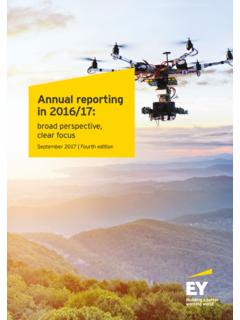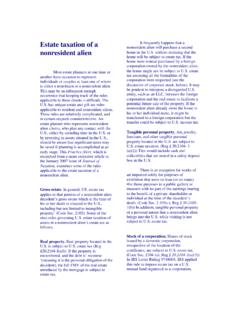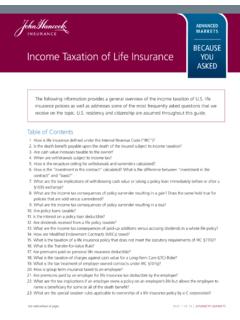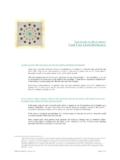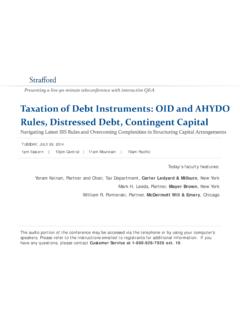Transcription of The dawning of digital economy taxation - EY
1 The dawningof digital economytaxationTop of MindIssues facing technology companiesInternational tax models: The Organisation for Economic Co-operation and Development (OECD)is set to finalize new international taxmodels later this profits tax (DPT):UK s DPT was implemented in April2015, with other countries moving totake similar (CbC) reporting:New CbC reporting will be due as earlyas 2017, for 2016 financial data,ushering in a new era of tax legislation:Broad new US tax legislation is underconsideration, though unlikely to passprior to the 2016 presidential tax (VAT):New VAT rules increasingly taxelectronically supplied services in thecountry of consumption rather than thecountry of coverage: Media coverage of taxation -relatedissues OECD s base erosion and profitshifting project (BEPS Project) aims toupdate taxation guidance for the globaldigital , borderless businessmodels are drawing greater scrutinyfrom tax authorities, by standardized digitalexchange of more comprehensiveinformation between companies and taxjurisdictions worldwide, CbC reporting isexpected to exert upward pressure ontax rates around the of offshore earnings fromglobalized IP and other sources remainscostly and now these earnings facethe prospect of higher taxes must manage more complexVAT requirements on internet sales and services effectively to make surecustomers are charged, tax authoritiesare paid and opportunities forrecovering VAT on costs are technology companies aretargets of interest.
2 Effectivecommunication emerges as key tosuccess. Are you tracking this far-reaching project and its implications for your tax planning? What is your economic ownership of intangible property (IP) by legal entities around the world and the transfer pricing of related intragroup/intercompany services? Where are your greatest reporting risks? What measures are you taking to mitigate them? What restructuring of deferred earnings might be necessary pendinglegislation? How would you transition, if legislation ultimately replaces the US current worldwide tax system with a modified-territorial system? Are your business models fit for recent and upcoming changes in VAT and other indirect taxes around the world? Are you painting a comprehensive picture of your global tax contributions,including calculations of: Property Payroll Sales Employee income taxes on stock-based compensation Corporate income taxTax change*Technology impactAsk yourself2| Top of MindThe dawning of digital economy taxation August 2015*Information subject to evolving policy deliberations and final G20 approval of the OECD BEPS Project expected in November the outset, technology companies have been in the vanguardof globalizing new digital business models that challenge sovereignborders.
3 As such, they have also found themselves in the crosshairsof policymakers and the media as tax issues have risen to newprominence. Pressures on the technology sector to restructure taxplanning are correspondingly early corporate adopters of digital economy tax structures,a trend is emerging toward onshoring certain key assets andactivities within their global tax bases (see box to right).Awakening to the new realitiesof digital economy taxationIn all likelihood, multinational technology companies are going to see significant upwardpressure on their global tax rates in 2016 some of them, even sooner. This stark conclusionis not arrived at lightly; it is the product of several inexorable changes occurring aspolicymakers worldwide usher in digital economy this context, onshoring takes on new meanings, among them: Aligning IP and its development, enhancement, maintenance,protection and exploitation (DEMPE) functions to new jurisdictions, typically where there are existing business operations Re-evaluating deferred foreign earnings in overseas jurisdictions that are raising taxes Re-shoring VAT and other indirect taxes from the country of supply to the country of consumption Companies will need time to make the most tax-effective transition from where they are today to where they will have to be in late 2015 to 2016.
4 Channing FlynnEY Global Technology Industry Tax LeaderTop of MindThe dawning of digital economy taxation August 2015 |3 New tax horizon is fast approachingCountries around the world are beginning to adopt new tax laws ordramatically change the way they interpret existing laws andbilateral tax treaties for an increasingly digitized, heart, the tax changes reflect governments attempt to catch upwith new cross-border business models employing borderless cloudcomputing and other cutting edge technologies. They are also beingdriven from the top down, by the OECD BEPS Project, whose newinternational tax models are expected to be finalized this year. Whilethe OECD declined to ring fence the digital economy for specialtax treatment within the BEPS Project, the organizationnevertheless declared the overall global economy to be digital andproceeded writing tax guidelines with profound implications fortechnology change is on the horizon and approaching fast butuncertainty about its timing and scope continues to keep manytechnology companies tax departments from taking action.
5 Somehave the false sense that change is farther out in time. Others particularly in the US continue hoping for rescue from highertaxes by a government-proclaimed tax holiday or some kind ofinversion (a once-fashionable cross-border acquisition andrestructuring strategy that was stringently reined in last year by theObama administration). Some may mistakenly expect they willautomatically get a foreign tax credit for any overseas tax others may simply be unaware of forthcoming requirements,such as disclosing more information about their global value chainsto more authorities around the and scope of change come into focus Time is not on technology companies side, however, as the leaderof the OECD BEPS Project stressed in a recently broadcastinterview. The impact of what we are doing will not take years, itwill be immediate, said Pascal Saint-Amans, Director of the OECD sCentre for Tax Policy and Administration. We are already having animpact. A number of companies are changing their tax structures toanticipate BEPS, he told the BBC in is more, the scope of change may be as broad as time is short(see table on page 7).
6 For instance, new OECD CbC tax reportingrules are expected to begin ushering in an era of tax transparencywhen the first reports are due as early as 2017, exerting upwardpressure on taxes around the world. The upshot is that tax departments, CFOs, boards and auditcommittees all need to be intently analyzing the now-emergingcontours of digital economy taxation and how to minimize theimpact on their bottom line. Companies are facing a very complex set of changes, saysChanning Flynn, EY Global Technology Industry Tax Leader. Theywill need time to make the most tax-effective transition from wherethey are today to where they will have to be in late 2015 to 2016. Implications will require changes in global accounting and financialstatements, adjustments to local tax profiles, preservation of foreigntax credits and more all without disrupting global value chains andbusiness life cycle faces realignmentIP is a focal point in the current environment. IP is often developed initially in one country and transferred offshore forfuture development in a tax-advantaged jurisdiction, while beingcommercialized in products and services that are sold in marketsaround the world.
7 This pattern provides one example in which acompany s fiduciary responsibility to make the best return onshareholders investments has come into conflict with taxauthorities duty to secure public revenue. For one thing, tax authorities in markets where the IP iscommercialized can be left feeling they should have more taxcoming to them. For another, US companies that accumulatesignificant income overseas at low effective tax rates find it difficultto bring those earnings back to the US without paying a muchlarger tax bill resulting in the so-called lockout effect. Pressure to realign globally commercialized IP and reallocate relatedintragroup/intercompany services, including DEMPE functions,registered a distinct uptick in April 2015. That is when the UKimplemented a new tax, called the diverted profits tax (DPT). TheDPT rate of 25% is higher than the standard UK corporate tax rateto encourage companies to declare profits locally. Australia isamong the countries following suit with similar measures, whilerelated tax policy work is also expected to conclude later this yearwithin the OECD s BEPS IP, in this context, could mean migrating it from a low taxor zero-tax jurisdiction to a new principal company jurisdictionwhere it will be taxed at a higher but, ideally, competitive OECD attacks aggressive tech tax plans, BBC, 14 May 2015, | Top of MindThe dawning of digital economy taxation August 2015 Digitization ushers in tax transparencyAlso exerting upward pressure on tax rates around the world will bethe OECD s new CbC reports, which will be due as early as 2017, for2016 financial data in countries adopting their use.
8 Comprehensiveglobal operational reporting by companies (including coverage ofall locations, legal entities and branches of operation) would beshared among relevant countries via government informationexchange mechanisms. Digitally enabled themselves, thestandardized CbC reports are expected to usher in a new era of tax some ways, greater transparency in taxation has already takencenter stage in the competition among nations to promoteinvestment in their own digital economies. Competing taxjurisdictions have been known to debate the propriety of theirpeers administrative rulings and whether they constitute illegalstate aid to companies local operations or housing of IP. TheEuropean Commission (EC) has been investigating majormultinational corporations along these lines. Sensitive informationthat surfaces in CbC reports could provoke more state , CbC reports could lead more countries to believe they are not getting their fair share of tax and to assess foreigncompanies accordingly.
9 Companies have to identify jurisdictions at risk and take other planning steps that can reduce the potentialimpact of CbC reporting, Flynn says. Notably, the requirementsneeded to implement CbC will also put new system andadministrative burdens on corporate rules relocate point of taxationVAT-type taxes are having a growing impact on technologycompanies around the world, and they are increasingly applied toelectronic services in the country of consumption rather than thecountry of supply. This pattern emerges from recent legislativechanges in the EU, Japan, South Africa and elsewhere, along withglobal governmental cooperation on the OECD s BEPS , onshoring takes on yet another meaning, with suppliers liableto charge tax in so many more jurisdictions. Nonresident suppliersof digital consumer services, in particular, need to review VATregistration and compliance implications, and whether theircorporate structure and business models are fit for recent andupcoming VAT changes, along with pricing strategies, profit andcash flow forecasting, and contractual arrangements with thirdparties in their supply legislation lags as foreign tax risks growThe US presidential campaign season, already underway, isexpected to prolong already lengthy deliberations on tax legislation,as well as uncertainty about both its potential scope and , deferred US foreign earnings, in the form of cash or ofpermanently reinvested earnings, are difficult to repatriate withoutfacing income taxes that at least approach the 35% top-linecorporate US tax , as seen above, these earnings face potentially higher taxesabroad.
10 US companies may believe increased foreign tax expensescan be offset by US foreign tax credits, but this will not always bethe case. The impact, instead, could go right to the bottom line oftheir financial and when US tax legislation is passed, it is expected to address a long-running debate over whether to continue with the current worldwide system or convert to a modified-territorial former taxes corporations deemed resident in the US onincome from all over the world (with offsets of foreign taxes toavoid double- taxation and with deferrals prior to repatriation ofearnings). The latter, as a rule, would not impose US taxes onactive business income earned by American corporations overseas,with various provisos and conditions included in different legislativeproposals. Companies transition planning should clearly be in theworks well before any law is passed. CFO engagement in tax matters has always been critical but is evenmore so today. Stephen BatesInternational Tax PrincipalErnst & Young LLP Top of MindThe dawning of digital economy taxation August 2015 |5 Variables and complexity multiplyCompanies face various combinations of these and other tax risksunder new digital economy taxation .


